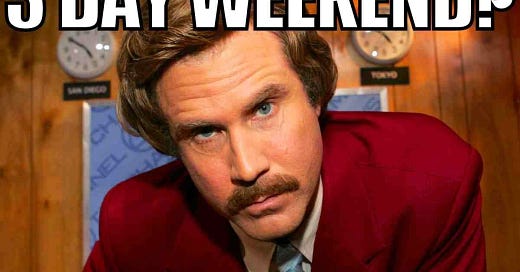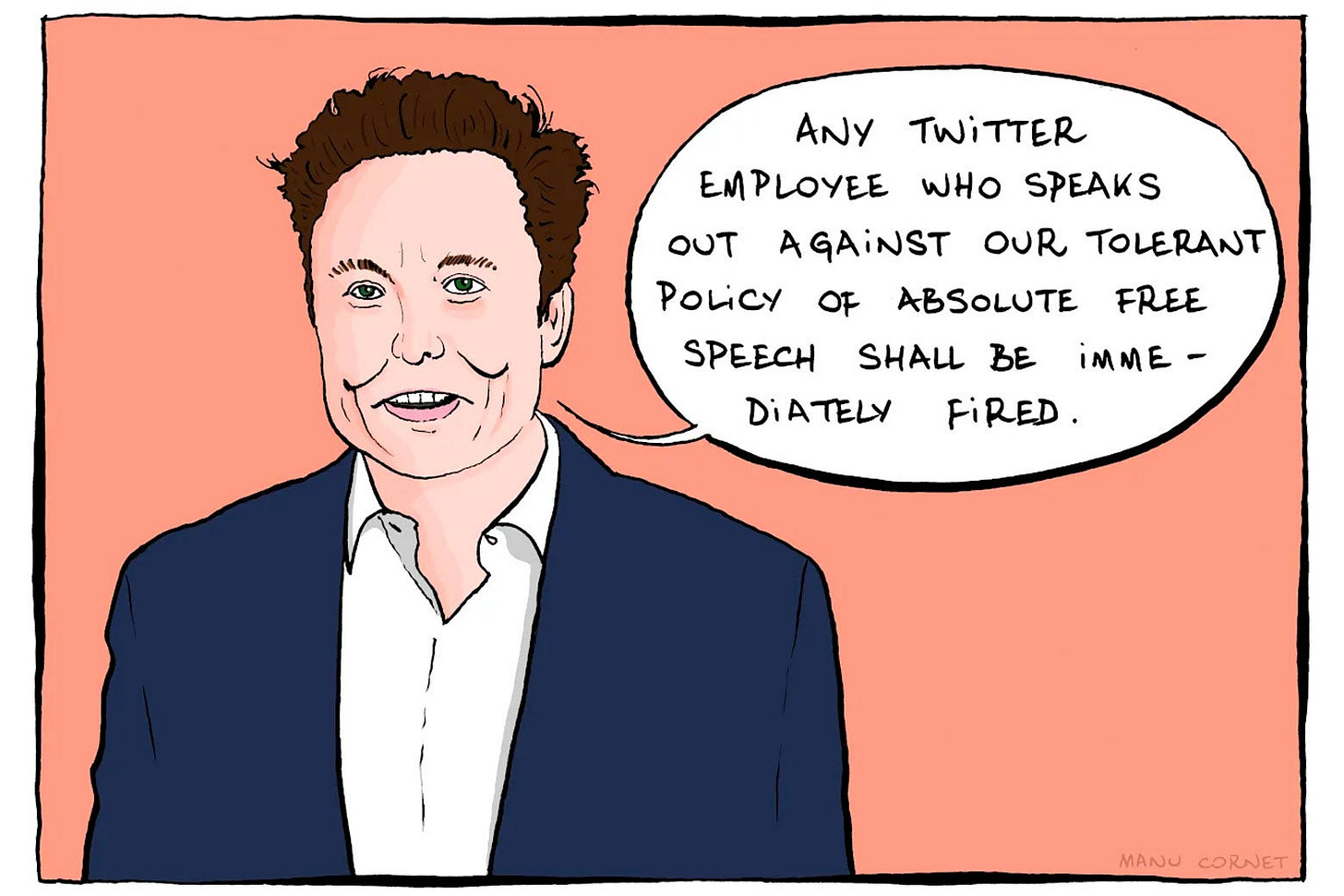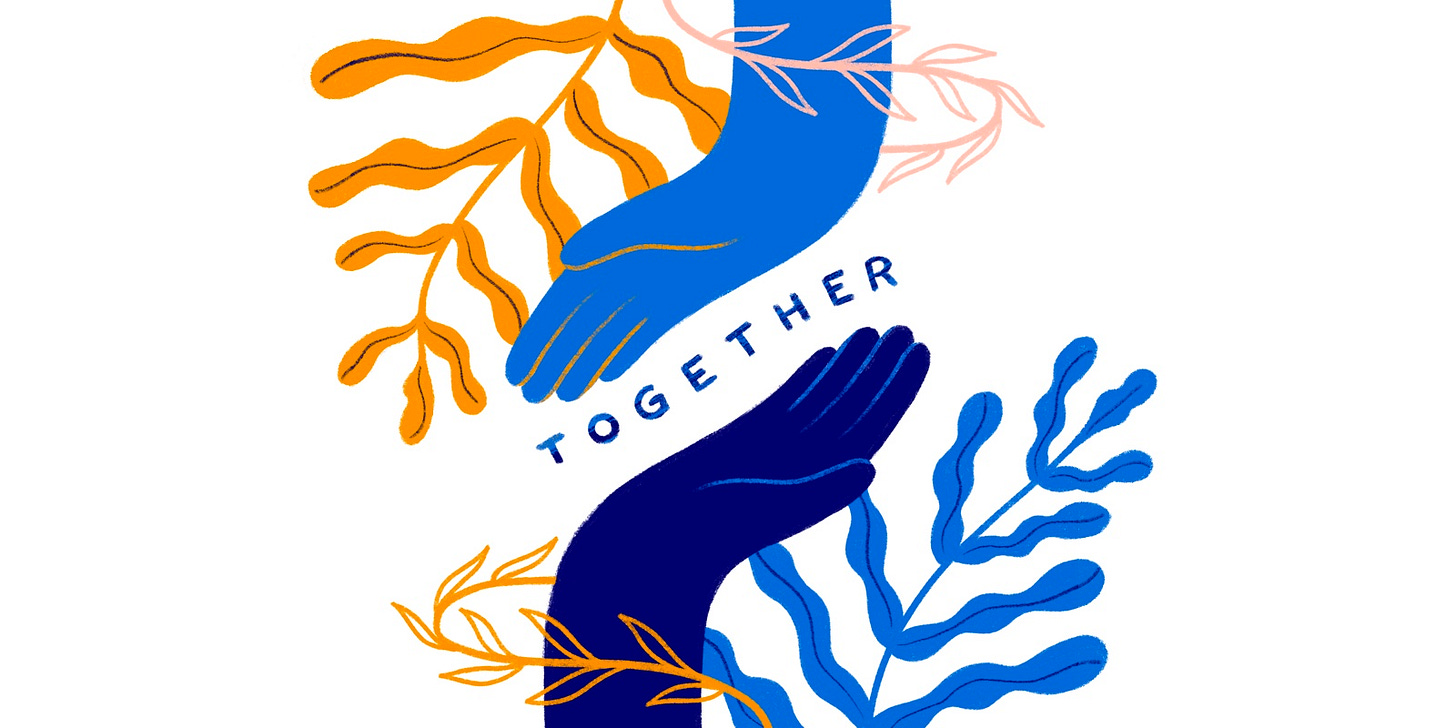The Year Communication Went Off The Rails
Side effects of poor communication, rethinking power dynamics, and the new work week.
As a reminder, The Next Big Think! will send you one number, two insights, and three links weekly to keep you ahead of societal shifts.
1 Number
#LessIsMore
92% of businesses said they intend to keep their four-day workweek.
This study conducted by the 4 Day Week evaluated the success of 61 U.K. companies and their 2,900 employees in implementing a four-day workweek.
Why pay attention? We see labor movements challenging business norms around time and productivity. The results show employers who introduce the 4 Day Week see overall gains in productivity and employee well-being. More isn’t always the answer.
2 Insights
#1. The Year That Communication Went Off The Rails
Source: The Twitter Worker Who Captured Elon Musk’s Takeover in All Its Cartoonish Glory Manu Cornet
What:
We are working through the ‘age of liminality,’ a transition phase from what was to what’s next. Communicating during these times isn’t easy, which has been painfully obvious. Consider the recent communication misses- Musk, Benioff, and the ‘crying CEO’? But this isn’t just about a misguided CEO; poor communication in a hybrid era creates ripple effects of stress and dissatisfaction in the workplace.
What the data tells us:
In our annual report with Grammarly: 2023 State of Business Communication, we found that poor communication creates stressful, disenchanted, and disenfranchised working environments.
Even though we spend more time communicating, we are getting worse!
We haven’t figured out how to be clear and human.
Poor communication fuels an environment for stress and even resignations.
Poor communication impedes inclusion efforts.
And poor communication impedes the ability to feel connected in hybrid environments, especially for Gen Z.
What to think about
Communication must be at the core as we collaboratively set the new standard for the future of work. How do you start? Leverage a shot of honey. Most knowledge workers say a positive tone in communication will lead to faster responses, improved job satisfaction, and relationships with colleagues. Keeping a pulse on your team’s communication preferences and feedback on current systems can also go a long way toward establishing optimal practices for everyone.
If you are interested in an in-depth discussion about these results, join Abbey Lunney and the Grammarly team at SXSW on March 10th at the Central District Brewery or - for those of you not attending SXSW this year - sign up for a live webinar March 22 (register here).
#2. ‘Power Over’ vs. ‘Power With’: Reconsidering The Role of Power Dynamics
original art by Katie Chandler
What
As the economy tightens, you might hear the media talk about power shifting back to the employer over the employee. Companies are starting to make new demands, forgo DEI commitments, and shrink benefits (e.g., demanding RTO, divesting in DEI, cutting paternity leave, and downgrading mental health benefits, etc.). WSJ declared The Bosses are Back in Charge, highlighting how CEOs are reasserting their authority over employees.
→ But this is where we want to PAUSE and challenge our thinking about power structures. ←
Today’s dominant power structure is called ‘power over,’ meaning when you gain power over a person or entity, you do what you want. This leads to zero-sum game models with winners and losers, and everything becomes a competition.
However, there is an emerging power structure called ‘power with,’ meaning together, all entities are powerful, and when everyone collaborates on mutually beneficial outcomes, all participants are stronger for it.
‘Power with’ isn’t a pollyanna fantasy; it’s interwoven into the movements of our times around peer-to-peer sharing, decentralization of value exchanges, fueling mutual aid, and employees-as-shareholders models. New technology has amplified and enabled the ‘power with’ model to collaborate, authenticate, and build cooperative value arrangements (e.g., DAOs, blockchain, NTFs/tokens, etc.).
What the data tells us:
A ‘power over’ structure leads to battles between employees and employers, shattering goodwill and long-term productivity.
Our recent ‘American this Week’ February tracker shows that employees are still seeking new opportunities and are not beholden to a power structure.
64% of employed Americans say they “could readily seek out a job with higher pay,” which only increases for Millennials (71%), and Gen Z (69%)
Over half (54%) of Americans say, “my company has difficulty retaining talent,” which especially resonated with Gen Z (63%)
Over half f Gen Z (56%) and Millennials (51%) believe their company “doesn’t have employees’ best interests in mind.”
‘Power with’ methods, such as increasing DEI leadership and employee ownership models, have been shown to improve business performance and productivity.
McKinsey found that ethnically diverse companies are 36% more likely to outperform less diverse companies. And companies with the most gender diversity on their executive teams were 25% more likely to experience above-average profitability.
The Financial Times covers the rising increase in employer ownership models in the UK
RM2, a specialist employee share scheme and employee ownership trust adviser, estimated in 2022 that the median productivity increase across the 50 largest employee-owned businesses was 5.2% YOY, according to the company's most recently published accounts — double that of the national average.
What to think about
Just start noticing the number of times the concept of ‘power over’ comes up in the media narratives, conversations, and leadership decisions. Simply begin to question if it has to be that way. Create space to imagine a world, business, and discussions involving more opportunities to create ‘power with’ people vs. ‘power over’ them.
Some inspiration to get started:
A new kind of bond is enlisting Americans in the fight against climate change
Airbnb is teaming up with landlords to let renters host their apartments
Nike’s Web3 Platform.SWOOSH Will Reward Creators for Virtual Sneaker Designs
Japanese prime minister says DAOs and NFTs help support government’s ‘Cool Japan’ strategy
Delta Air Lines Just Made a Big Announcement That Should Make Delta Employees Quite Happy
3 Links
Why we loved Everything Everywhere All at Once — and why we hope it wins the Oscar (Vox)-- (our top choice!) And a history of how Asian Actors have been underrepresented in the Oscars (NYTimes)
How To Take Over The World: Joan of Arc (Podcast)-- Happy international women’s month!
Nestlé’s Blue Bottle brews up interest in premium coffee through ultra-rare launch (Food Dive) --hint, it’s Yemen ;)
Bonus: Check out our recent work with Grammarly: The 2023 State of Business Communication.
Curiosity is contagious; if this newsletter makes you think or smile, please share it!!
Penned by Libby Rodney and Abbey Lunney, founders of the Thought Leadership Group at the Harris Poll. To learn more about the Thought Leadership Practice, just contact one of us or find out more here.
















